By Nick Cariello
It was with great anticipation that I sprang up the snowy steps of a Milwaukee building in January 1942 and entered the Marine Corps Recruitment Center. Many enlistees were milling about. I was impressed by a sign in big bloodred letters that hung on a wall: JAP HUNTING LICENSES ISSUED HERE. One big recruit pointed at the sign and snickered, “Yeah, I sure the hell am gonna bag my quota!”
I had actually decided to join the Marines in the temporary recruiting office in Racine, Wisconsin, my hometown, 25 miles away. Before departing for Milwaukee I went with my anxious mother to a notary public office to sign a necessary paper. My mom was reluctant, saying: “Nickie, like I told you, why can’t you just wait until the draft?”
I’m sure she expected and dreaded the firm “No!” that I uttered. So with a deep sigh and tears glistening on her face she slowly signed the paper, saying with anguish, “I just hope I’m not signing your death warrant.”
From Chicago to San Diego
On the train for the tedious journey to San Diego we Marines were clustered in one car. And were we ever excited! The farthest I had ever been from home was Chicago, just 60 miles away.
We smoked and bantered and read tattered magazines and slept curled up in our seats. Three days passed as the train’s monotonous clickety-clack lulled us. I was half asleep at early morning when somebody shouted, “Jeez, will you look at that!”
I peered out the window and saw that we had pulled into the San Diego train station. We cheered and stretched. As we leaped off the train we were met by buses that transferred us to the Marine Corps Recruit Depot.
The day sped by as we were given inoculations and Marine uniforms and then in assembly-line style were quickly shorn of our long locks.
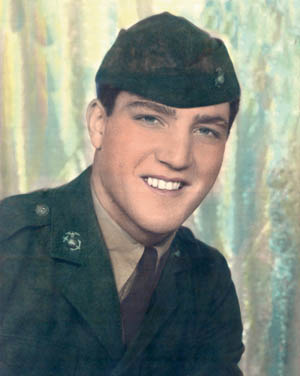
We were marched to a mess hall where we devoured oversized steaks, assorted vegetables, tons of cold milk, warm bread, and jiggly Jell-o.
Then we were taken to temporary barracks where we talked excitedly despite being exhausted. When it was time for “lights out,” I fell asleep when my head met the pillow.
I was shocked out of slumber by a recorded bugle blaring out reveille. Glancing at my watch, I saw it was only 5 am. “Huh,” I moaned and thought, “Are these f**king people crazy or what?” I went back to sleep.
Then a beefy corporal, full of bile and bluster, burst into the room shouting, ”Okay, drop your cocks and grab your socks! You have only 20 minutes to do your number one and/or number two and shave your ugly faces! Let’s go!”
Sleepily I stumbled out of my lower bunk while the equally sleepy Marine above me jumped down and practically knocked me over.
“Our Best and Only Friend”
After a hasty breakfast we learned that we were moving from our comfortable barracks to tents. Each tent housed four Marines. We were told that the tents would be “home, sweet home” until we left boot camp eight weeks later.
Soon after leaving our tents we met our DIs (drill instructors). One was named Green, he was tall, taciturn, and all business. The other DI, whose name escapes me (I’ll call him Black), was much shorter, muscular, and talkative.
Before long we were out on the parade ground getting acquainted with the concrete, learning the fundamentals of being Marines.
As the long days passed, we recruits learned precision parade-ground marching. I found myself enjoying the almost hypnotic snap of the DI’s voice when he barked commands such as, “F-o-r-w-a-r-d march! Oblique left, oblique right, to-the-rear march, right turn, left turn, and HALT!”
The outdoor movies on base that we attended were mostly war films that were blatantly propagandistic. We would boo and stamp our feet whenever the hated Japanese appeared on screen. And occasionally when a romantic film would be screened we would also boo because who the hell wanted mushy-gushy, kissy-face B-movie plots!
On the rifle range we were introduced to what the gunnery officers emphatically described as “our best and only friend”–– the ’03 Springfield rifle of World War I fame. It was considered most reliable with its smooth bolt action and its magazine containing five cartridges.
I discovered on the first day on the firing range that my eyesight wasn’t quite 20/20. I did fine hitting targets at 100 to 150 yards, but beyond that my accuracy fell dramatically.
But I did manage to squeak out a Marksman award with the Springfield. Despite knowing that sniper school was not for me, I was still confident I could pop a Japanese soldier at 150 yards.
First Major Offensive Against Japan
After eight weeks the long-anticipated graduation day from boot camp arrived, and we had a photo taken of the platoon with drill instructors Green and Black standing in mock sternness among us.
Then Green declared triumphantly: “Listen up! You’ve lost your girlish laughter and your baby fat. You are now officially Marines!”
We cheered and hollered when informed that we would be blended into the 2nd Marine Division based at Camp Gilbert, 15 miles away.
We had been magically transformed from a gaggle of smart-ass know-it-alls into mean, lean, tough, spunky Marines. And the Marine motto, Semper Fidelis (Always Faithful), now seemed seared into our very souls.
At Camp Gilbert we underwent tough training such as descending simulated cargo nets with full gear; practicing on the bayonet range; squirming under live machine-gun fire aimed just above our heads; and stumbling on forced marches of 20 miles.
The scuttlebutt became intense that we would soon leave for the Pacific. Finally the announcement came and the 2nd Marine Regiment of the 2nd Marine Division went aboard vessels accompanied by a large array of warships. Our troopship, along with several others, left early one July morning in 1942.
Several of us stood quietly at the stern of our ship, bewitched by the colorful fluorescent waves churned up by giant propellers. We watched as the varied lights of San Diego slowly began to fade. I pondered what adventures and misadventures lay ahead.
Boredom began to set in after several weeks of sailing. We kept busy cleaning our weapons and hearing lectures about Japanese military tactics as well as Marine philosophy. Finally we were told that we were to land on August 8 on Tulagi in the Solomon Islands. The 1st Marine Division was scheduled to hit the main island of Guadalcanal, where the Japanese had built an airfield, on August 7. We cheered when informed that we would be taking part in the first offensive to roll back the relentless Japanese tide in the vast Pacific.
Landing on Tulagi
There was unusual quiet aboard ship the night before our landing on Tulagi. We had heard the 1st Marine Division had met little resistance the day before during its invasion of Guadalcanal, some 25 miles from Tulagi.
Dawn finally arrived and we went over the side of the troopship and down the cargo nets into Higgins boats. The Navy had laid down a fierce barrage prior to our storming the beach. I became extremely apprehensive as I saw the tops of coconut palms sheared off and strewn about like camouflage.
We vaulted from the landing crafts into shallow water as noncoms and officers were yelling above enemy gunfire, “Go, go! Spread out, you stupid s**theads!”
I sprinted ahead and ran faster when I saw a dead, bloody Marine lying twisted on his side in the surf. Reaching shore I heard enemy machine-gun bullets whipping past my legs. My first thought was a silly one: “Hey, those crazy bastards are trying to kill me!” I was most grateful when somebody tossed a hand grenade that silenced that damn machine gun.
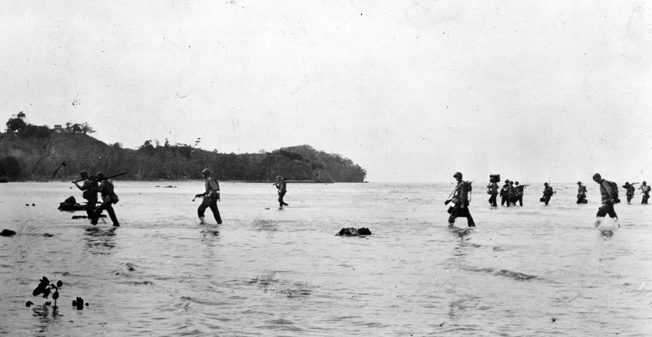
After a hectic hour, our sector was cleared and we rested under palm trees and swigged warm water from our canteens. Then we were ordered to the eastern tip of the island where we dug foxholes and boasted about the initial battle. With braggadocio we expressed hope that the few remaining Japanese would counterattack so we could “kick their yellow asses.”
Several days of hard fighting later, the island was relatively secure except for a handful of die-hard Japanese still holding out. Then our company moved to protect an area called Chinese Village. Merchants had migrated there from China years earlier and set up a few ramshackle buildings but were now long gone.
The “Minnesota Kid”
We settled down for the night in our foxholes. Toward dawn we were awakened and shaken by two shots. Nearby a Marine in his foxhole yelled, “Hey, Nick, what the hell was that?”
“Jeez, I don’t know, but keep your head down,” I said groggily as I grabbed for my rifle. My other hand darted to my upper pocket to make sure my grenade was still there. What had happened turned out to be a severe blow to our morale.
One of our company, a youth from Minnesota whose name was Olmsted, had left his foxhole, apparently to urinate. A Marine standing guard had heard the movement in the dark, panicked, and fired, killing Olmsted.
The next morning we were glum and shaken from the night’s traumatic event. As we left the area, the Marine who had killed the “Minnesota Kid” was sitting against a tree. He wore a forlorn look and refused to glance up as we filed by.
I didn’t know him very well, but I felt sorry for him. How do you live with that, I thought. A jumble of emotions must have been swirling through his mind. A few days later he was transferred to another unit. This was standard practice in case a friend of Olmsted would try to seek revenge.
Under Fire From Japanese Warships
One night we heard what we called our mail boat chugging toward our harbor. It was a small vessel that plied the waters between Tulagi and Guadalcanal, carrying mail, personnel, and supplies. Suddenly we saw the long finger of the searchlight of a Japanese warship, probably a destroyer, pick up the helpless mail boat. The destroyer fired its guns and the mail boat exploded, sending fiery debris skyward.
To our horror we heard a voice crying from near the flaming wreckage, “Help, oh God, somebody please help me!” But the boat was too far out and there was nothing we could do. The weakened cry for help continued for a few minutes. And then silence.
I vividly recall another night when Japanese warships shelled Tulagi for 30 minutes. We scrunched down into our foxholes, and I was wishing I could crawl into my helmet. I was scared as the shrapnel sang a deadly song over our heads. In the morning we learned that two Marines had been killed.
The next day I was among a small group who volunteered to invade a tiny island near Tulagi; a few runaway Japanese had been spotted there. We piled into a Higgins boat and hit the beach a few minutes later. A patrol was formed to go around the island, skirting the water’s edge. We moved out cautiously. Suddenly came the deep, 20-round burping of a Browning Automatic Rifle, which was carried by the Marine who was leading. I was third in line, and as I made my way forward I was shaken to see the recipients of that incredibly loud fire. Inside a shallow cave were the mangled bodies of three Japanese. Gore and guts had been splattered on the sides of the cave and the strong smell of blood wafted toward us.
We completed the circling of the island and then swept across it without further incident. Ironically, we learned later that the Japanese who were killed had apparently thrown away the bolts to their rifles prior to the encounter. This was standard Japanese procedure for preventing any captured weapon from being used by their enemy.
Leaving Tulagi
Supplies were slowly arriving, but we were still short of food. Early on we found cans of strange Japanese vegetables. But the strange fare didn’t taste bad, given how hungry we were. Also found were bags of buggy Japanese rice. At first we carefully picked out the insects. But it was tedious. So we gave up, saying what the hell, joking that the bugs would give us extra protein.
We made another surprise find inside a shack: Japanese porno magazines! Giggling and shoving, we lined up to peek at the black-and-white drawings. We laughed and stamped our feet in derision at the crude artistry.
After two months on Tulagi, news from Guadalcanal was becoming grim. The Japanese were landing sizable forces, and frequent battles were occurring. In addition, the Marines were harassed by Japanese naval fire and bombers. In late October we got word that we would be leaving for Guadalcanal to beef up the battered 1st Marine Division. Cheering ourselves hoarse, we tossed our helmets into the air and pounded each other’s back. We couldn’t wait to get to the big show.
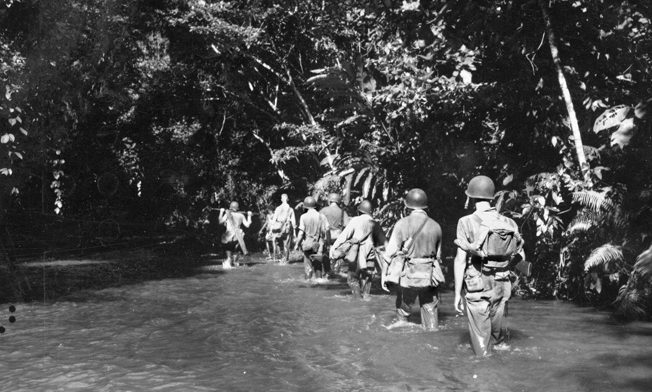
A breeze was blowing the next morning as we left on Higgins boats for Guadalcanal. I looked back at the lush, dark island of Tulagi and realized that it was there I had grown up. I had seen dead Marines and slain Japanese, and those awful scenes were seared into my memory. And although I was still only 19, I felt that now I was a man––and certainly a Marine.
“You Got a Ciggie, Friend?”
As we approached Guadalcanal we saw many coconut palms strung along the beach, while the rest of the foreboding island looked dark with super-abundant foliage. Black rain-laden clouds dangled over the ominous-looking mountains to the south.
We piled out of the Higgins boats and were greeted by natives with, “You got a ciggie, friend?” I noticed one cheerful middle-aged native with an enormously swollen leg. Later a corpsman told me it was probably the result of the tropical disease elephantiasis.
We moved inland and bivouacked after digging the ever-necessary foxholes, which came in handy that night as the Imperial Japanese Navy bombarded the beach area. It was absolutely paralyzing as the shells screamed in and exploded at nearby Henderson airfield and among the palm trees we were under. We lost two more Marines that night, including a pleasant kid named Gueydan who was from the Missouri Ozarks.
Fighting at the Matanikau
The next several days were rife with scuttlebutt about an upcoming operation. Extra ammunition, water, and food were brought in by trucks that we unloaded like stevedores. Then came word that our outfit, Fox Company, would be in support of several units of the 1st Marine Division in a coastal offensive.
We started out through a coconut plantation; the objective was to confront the enemy near a river called the Matanikau. Our company moved slowly forward despite sniper fire and the thunderous thunk, thunk of enemy mortar shells falling in the area.
The tension was almost unbearable and we made sure we followed the Marine commandment of spreading out.” Every nerve in my sweating body seemed strained as I crept forward.
Suddenly enemy artillery shells came slamming in. Somebody yelled “37’s!” You could hear them being fired and almost immediately, it seemed, you’d hear the terrifying WHOMP! of the damn shell hitting close by.
I was thankful that nearby was my good friend, Stanley Glowacz, from Nebraska. He was effervescent and extremely articulate with a finely tuned sense of humor. He flashed a pixie grin when I once told him that I admired his fluent BS. (Stanley later was killed during the brutal battle for Tarawa.)
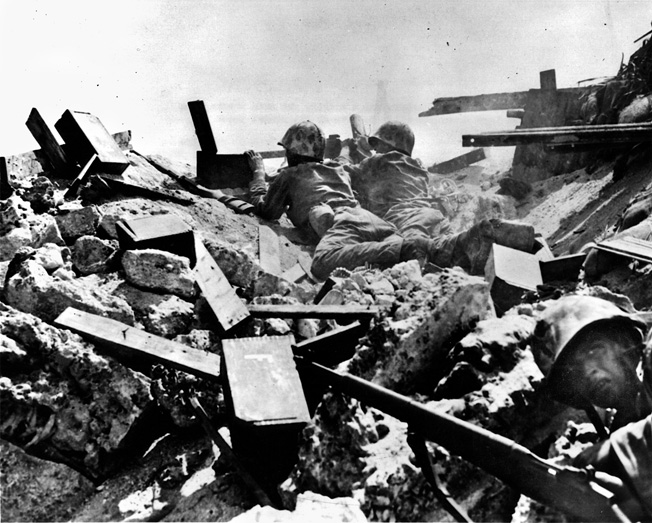
We dove for cover under a log that was propped up by another tree just off the trail. Mosquitoes buzzed my face, and stinging ants covered my hands. I swiped at them while trying to burrow like a badger into the stinking, decaying vegetation.
Rather morbidly, I thought about the $10,000 life insurance policy I had taken out. I had recently written my sister Mary that if something happened to me, she should tell my parents to buy a car and to use the rest of the money to pay off their mortgage.
I shuddered. I sweated. I cursed. I cringed. I prayed in a bargaining mode: ”Please save me, God. I’ll do good and be a better person. Honest I will!”
Then a shell howled in and struck nearby. A panicked cry rang out: “Corpsman, somebody’s been hit! Corpsman, hurry!” A 37mm shell had landed between the outstretched legs of a Marine and had virtually sliced him in two.
“Time to Move Out, Boys”
About five minutes later, when the shelling began to ease, Stanley Glowacz shouted, “Holy s**t, Nick! Look to the left. Look!”
I turned my head and was simply stunned. Two Marine generals were casually strolling down the narrow trail wearing neat khaki uniforms. The tallest wore a one-star insignia and the other two stars. Both carried swagger sticks and side arms. The shorter general, astonishingly, was smoking a cigar with smoke curling around his head. And there were snipers in the area!
To say that I, one scared 19-year-old kid, was impressed by the calm presence of those generals would not do justice to their audacity. The pair just sauntered along with big smiles on their leathered faces as though they were just leaving the country club back home. The tallest one kept repeating in a moderate and reassuring voice, “All right, boys. It’s time to move out. Let’s go now.”
The generals never shouted. They never implored. They didn’t curse or raise their voices. The tall one just said quietly over and over, “Time to move out, boys.”
The enemy shelling had virtually stopped when a noncom bellowed: “Okay, you friggin’ pansies. Let’s move. Double time!” But it was the incredible example of bravery under fire of those taciturn generals that ignited the courage we needed. Along with others, I leaped up and advanced, dodging and throwing myself on the ground and repeating the process.
We cleaned out several Japanese positions and even found an abandoned 37mm artillery piece. Some Marines stopped and gleefully urinated on the hated weapon. I came upon the body of a Japanese officer with the side of his head ripped off. I hurriedly searched his pack and found a tiny Japanese flag. But the real find was a small black box that contained a pair of intricately carved ivory chopsticks. I quickly stuffed the “spoils of war” into my own pack.
A 10-Carat Hellhole
The drive soon ended when we determined that the Japanese had retreated. Our company was pulled back to protect the eastern approaches of our invaluable stronghold at Henderson air field. Thankfully, it was a relatively quiet front and we were able to relax.
We also thoroughly hashed over the remarkable incident of those generals who inspired us and whom we never saw again. In that particular fog of battle, we never did find out who they were. Were they from our 2nd Marine Division or from the 1st Marines? General staff members or visiting dignitaries or what?
After a few days we were moved to an active sector. It seemed to rain almost every day now. The sticky mud tugged at our boots with a soft sucking sound. Adding to our misery was the ever-present multitude of insects that would haunt your ears, invade your nose, and crawl down the neck of your ever-damp fatigues.
And especially bothersome were those damn big mosquitoes! At times they seemed the size of hummingbirds. Once I watched with fascination as a huge mosquito perched on my arm and drilled its proboscis into my skin. It leisurely took its fill and floated off bloated with my blood. I said something silly like, “Dinner’s on me, pal.”
Our company began patrols that were uneventful until one morning when we were ambushed. We were crossing a jungled ridge when enemy gunfire raked us. Casualties were numerous, including a machine-gunner named Jack who was killed trying to set up his weapon.
One Marine, “Pop” Suttles from Arkansas, crawled up a rise and was looking down in a half-crouched position. I was just below him and heard a thud. Suttles fell back with a bullet in his chest. I yelled for a corpsman, who yelled back, “Bring him down!” Suttles was moaning as I and another Marine pulled him off the ridge. But he died. Then I crawled up the ridge and threw a grenade into the valley. It boomed and I heard excited Japanese voices. Maybe I got lucky, I thought.
We picked up our dead and wounded and fought our way out of danger back to our safe sector.
What a 10-carat hellhole Guadalcanal turned out to be with its oppressive climate. Diseases such as dysentery, jungle rot, and malaria, along with inadequate nutrition, had weakened us. Misery and melancholy were twin emotions prevalent in that accursed jungle environment, which was infested with stubborn, loyal-to-the-death Japanese.
On Leave in New Zealand
Then finally, in January, we heard that the 1st Marine Division was leaving for Australia. The U.S. Army was starting to come. And before long an Army unit took over our duties as the Japanese were near defeat.
We departed for New Zealand for rest and rehabilitation on January 31, 1943. We were a tattered and battered bunch that boarded ship. Many of us were underweight and overtired. Some were dispirited, but most of us still maintained a cocky esprit de corps attitude.
And we were fervently hoping the girls in New Zealand would be cute and co-operative. And they were.
Soon the morale soared in our camp as we fattened up on mutton and milk, stews and steaks, fish and fruit. Morale was given an added boost when Artie Shaw and his swing band came in for a visit and played popular tunes such as “Begin the Beguine.” We simply went bonkers and danced wildly in the aisles with each other.
Booze and beer were available in Wellington. We went to dance halls and bars and were welcomed into the homes of New Zealanders who were grateful for us saving them from the Japanese. Romances flourished with the local girls, and even wedding bells clanged for some Marines.
We knew things were about to get really serious again when we were issued the new (to us, anyway) M-1 Garand rifles, which were semiautomatic and held an eight-round clip. For months we trained in amphibious landings on the beaches. In November 1943, after eight months in New Zealand, the division was plumped out with replacements and about 20,000 strong.
Finally, with much excitement, we boarded ships. After several days of sailing we were told of our mission. It would be the taking of a Japanese airfield in the Tarawa atoll in the central Pacific.
The Fortifications at Betio
The main objective within the Tarawa atoll was an island called Betio. It contained the airfield with its bomber strip. Its capture was critical because Japanese aircraft based on Betio were a threat to Allied shipping from Hawaii to Australia and New Zealand.
Betio is surrounded by a treacherous coral reef and is only about 2.5 miles long and 800 yards across at its widest. Its highest elevation was just 10 feet. According to Marine historians, this little speck of sand was said to be the most heavily defended ever invaded by Allied forces in the Pacific. Japanese Rear Admiral Meichi Shibasaki, commander on the island, boasted to his 4,800 troops that a “million Americans couldn’t take Tarawa in a hundred years.”
Fortifications were awesome. Steel and concrete barriers, along with minefields and extensive strings of barbed wire, protected the three beaches selected for landing. Nearly 500 pillboxes were scattered over the island. Also present were fearsome 8-inch guns mounted on turrets. In addition, there were anti-aircraft and anti-boat weapons along with howitzers. Machine guns were seemingly implanted everywhere, along with scores of mortars.
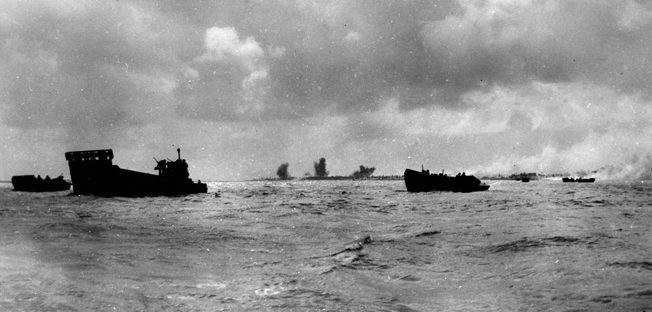
The night before the landing, we sat around cleaning our already spotless weapons. I looked around at the anxious faces of fellow Marines and thought, “Jeez, but we sure are a bunch of young punks.”
Bravado filled the air. We joked and smoked and heckled and sweated on deck and in the holds. One Marine, known as “Big Red from Alabama,” wondered in his southern accent “if there were any gals on the island and would they be horny and cooperative.”
We laughed, punched the air with enthusiasm and yelled, “Yes! Yes!”
Then a Marine stood up and started singing a ribald song many of us knew. Then somebody began singing the Marine Hymn, and we all chimed in with enthusiasm if not talent. At the finish we cheered and hollered for a long time. Sure, we were Marines, but I noticed many a moist eye.
On an Amtrac Bound For Betio
About 3 am on November 20, 1943, came the call to prepare for debarkation. We gathered our weapons and shook sweaty hands all around. Then we did what infantrymen have done for centuries: we nervously waited and waited––and then waited some more. I admitted to myself that I was scared, really scared. Then I thought, “Hey, that’s good. I’ll be more alert.”
Finally we were told to go over the ship’s side, and we made the dangerous descent down the cargo nets and dropped into the bobbing amtracs (amphibious tractors). They were slow but capable of moving ashore through rough surf.
I made my way forward to one of two .50-caliber machine guns aboard our amtrac. Though I was a young PFC, my squad leader had chosen me for that position, and I was most proud and knew others were envious. I checked the weapon, which had already been loaded. Its new paint reflected dully and menacingly. Stroking the gun fondly, I said something inane like: “Don’t let me down, pal.”
As the amtracs chugged along, the battleships Colorado and Maryland fired their massive 16-inch guns. We cheered when we saw the red-hot shells howling toward shore. Monstrous fireballs erupted on Betio, perhaps indicating that an ammunition dump had been hit. Plumes of black smoke enveloped the beaches as air attacks began. The incredible noise started to mount.
I looked in disbelief at the havoc being created by the naval pounding and air strikes. I vividly recall becoming extremely apprehensive and I felt my heart ratcheting up. Looking out at the armada, I felt like an ever-so-tiny cog plugged into a vast killing machine. I then glanced at my fellow machine-gunner across the amtrac, who had a grim look on his young and unshaven face. But he smiled, flashed me the victory sign, and quickly turned back to his own business.
Time seemed fractured as we circled for what seemed a minor eternity. The blue-green ocean glistened and oppressive heat began rising from the deep waves. Finally the order came to head for the island; our vehicle was in the first wave. As the amtracs chugged toward shore, my mouth felt like I was chewing on cotton. I took a big swallow from my canteen, but it didn’t help.
Approaching the Beach
We were perhaps 50 yards from shore when the overwhelming sound of battle increased in intensity. It was piercing beyond belief. The terrifying crescendo was almost paralyzing. I thought my eardrums would crack.
The din came from a slew of Navy dive-bombers spreading their deadly eggs across the smoking island. Fighter craft relentlessly strafed the beaches. Warships added to the deafening cacophony as they belched salvo after salvo inland and along the battered beaches. The pizzicato humming of enemy machine guns, large and small, was almost continuous. Huge splintered palm trees were splayed against the vivid blue sky. Heavy smoke and dust swirled, making it difficult to see.
Then I noticed an incredible sight to my left. A intrepid destroyer had slipped in close to our landing site, with its propellers furiously churning to keep from grounding. Its 5-inch guns pounded the shore in our support. Two sailors, one sitting and another standing, raked a gun emplacement with automatic rifles.
I began firing the .50-caliber. It coughed heavily and danced erratically in my sweating hands, making it difficult to control as the amtrac bounced crazily in the surf. But I managed to fire along the shoreline as we closed in.
It was then that I saw them. Eight or so enemy soldiers in brown uniforms were dashing ghostlike through drifting smoke toward a large bunker. I swung my weapon around, took careful aim, and pulled the trigger. But nothing happened.
“Damn it!” I shouted. The gun had jammed. Hurriedly I tried to unjam the weapon but couldn’t. “You lousy piece of s**t,” I yelled in anger as I struck it sharply with my palm. Then I realized I was wasting time. I grabbed my rifle and snapped off three shots before the Japanese disappeared through the smoke into the bunker. I might have wounded or killed several, but who knows?
“Everybody Out, Now!”
Suddenly our platoon leader, Randy Johnson, a fearless guy from Minnesota, yelled, “Everybody down! Get your frigging asses down!” We obeyed instantly as heavy enemy fire was zipping all around the amtrac. Finally the vehicle crunched onto the sand and wheezed a few yards inland.
“Everybody out, now!” Johnson screamed. We tumbled over the side and landed on wet sand with Johnson shouting, “Damn it, spread out and move forward. Go, go!”
I lurched forward through the sticky sand, weighed down by two grenades, two canteens, my ammo belt, an entrenching tool, a three-pound helmet, a pack containing assorted paraphernalia, and my 9.5-pound rifle. I wished I were wearing a thick suit of armor instead of flimsy fatigues.
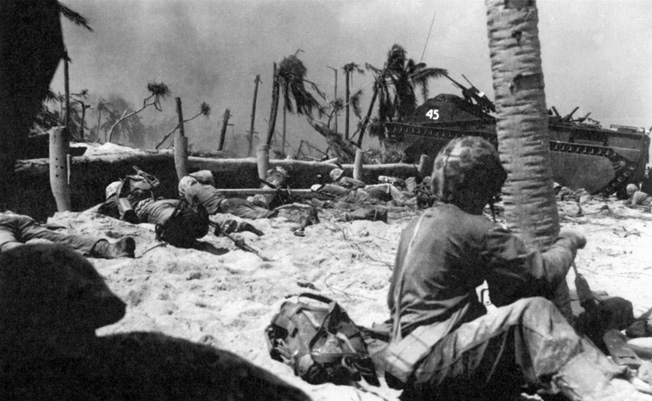
Moving ahead with several others, we found a big shell hole about 20 yards inland. We hunched down at its bottom, mindful of enemy machine-gun bullets whining overhead. Finally it stopped. I raised my head and considered throwing a grenade at the machine gun that I had spotted behind a log. I had played football in high school and had a good arm. But the distance was just too great. So I furiously fired my rifle at the emplacement. Two other Marines joined me, and one had a BAR. He set up the weapon, and the burp-burp-burp of the Browning with its 20-round clip was reassuring, though deafening.
Then we heard a faint yelp. The operator of the Browning asked, “Hey, you think we got any?” I answered, “Yeah, I believe so. Maybe they’ll stay low for a while.”
Smoke from our gunfire drifted over our shell hole. Since there was no return fire we figured we either got lucky or the machine-gun crew had moved farther inland.
Diving Into an Enemy Dugout
I had never known fear like I was now experiencing. It penetrated the marrow of my bones. I noticed I was breathing shallowly, so I forced myself to take deep measured breaths. There was a constant metallic taste in my mouth that I found most strange. Fear never left me. I noticed that my muscles were tight and that I was exhausted. It was impossible to relax in the saunalike heat that drained my energy; Tarawa is only 80 miles north of the equator.
My lips were starting to split and my face felt sunburned. I was soaked and sticky, as sweat had gathered in my armpits and then slid down my chest and legs. I felt like I was a tightly wound toy, ready to do anything and everything.
Suddenly a mortar shell whistled in and hit the top of our shell hole a few feet away. We ducked and cringed and cursed and prayed, but nothing happened. It was a dud. We were still shaken when we decided it was time to move out, so we dashed out of the hole and ran forward. Then that damn machine gun came alive and I could hear bullets chip-chip-chip-chipping the sand perilously close to my feet.
Then I did something dangerous, and perhaps foolish, but it probably saved my life. I saw a small opening into what apparently was an enemy dugout, and I dove into it without hesitation. It was neatly carved out of the earth. Empty food cans were strewn about and the odor of strange food permeated the area. Luckily, no enemy was present or I could have died there.
The Wounded Sergeant
As I left the dugout I saw that I had been separated from the others, so I sprinted forward. I saw another large shell crater and fell into it. Four Marines were there, none of whom I recognized, but apparently they knew each other. One was a sergeant who had suffered a groin wound. A makeshift bandage covered his injury and he moaned as his bloody hands kept opening and closing around the wound.
We conferred and agreed that the sergeant needed immediate medical attention. Our location was perhaps 40 yards from the beach; two Marines volunteered to run for a stretcher.
Dusk was near as we anxiously awaited the return of those Marines. The wounded sergeant continued to moan. We could hear the unrelenting gunfire on all sides.
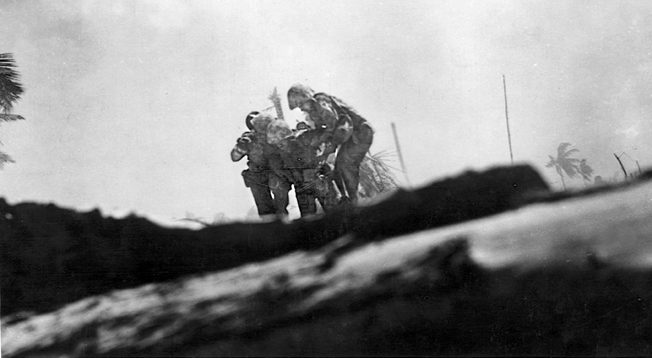
Finally the two soaked-with-sweat Marines returned. We carefully loaded the now-quiet sergeant onto the stretcher. One Marine said softly, “Let’s go,” and we quickly moved out. There had been gunfire, but now it seemed strangely quiet.
It was nearly dark. Cautiously we moved toward the beach, expecting sniper fire, but none came. I had the wishful thought that perhaps the snipers were withholding their fire because of our mission of mercy. Not likely, I concluded, but you never know.
“Corpsman!”
As we neared the beach, other Marines in the area appeared almost as shadows. Suddenly there was a stunning blast and I felt like I had been swung up by a giant hand and then slammed hard to the ground. I remember wondering what the hell was I doing on my back. I managed to roll over. My legs felt like they had been seared with a blowtorch, and they burned with almost unbearable pain caused by jagged fragments from an enemy grenade. Many pieces had torn deeply into my buttocks and upper thighs.
Many cries for “Corpsman!” rang out, and mine was among them, shouting, “My legs, my legs, are they gone?” I was sure I was dying. A profusion of confusion erupted and there were excited cries of, “Get that Jap bastard! Will somebody get that bastard?”
Those of us who had carried that stretcher believed other Marines might have thought we were enemies because it was near dark. I yelled, “Hey, for Christ’s sake, we’re Marines! We’re Marines!”
Others joined my frantic plea. Then I spotted the silhouette of a Marine who yelled back, “Damn it, guys! I know it! I know it!” He pulled the pin from a grenade and tossed it into a spider hole. There was a muffled explosion and he shouted in triumph: “Yes! I got ‘em! I got ‘em!”
Stretcher bearers magically appeared out of the dark. Gentle hands loaded me onto a stretcher while a corpsman skillfully gave me a shot of morphine. The awful pain lessened. As I was being carried to a first-aid station on the beach, I thought I recognized the voice of one of the stretcher bearers. I said, “Hey, Tim, is that you?”
He said, “Yes, and who are you?” I told him and he said tearfully, “Oh, my God, the men from Fox Company I’ve picked up today!’’
We reached the first aid station and I was taken off the stretcher. Two figures loomed above, one holding a tiny flashlight. The one with the flashlight hurriedly examined me and then I heard him say the sweetest four words I’ve ever heard: “There’s no hemorrhaging, doctor.”
Transfer to a Troopship
Morning came and I was still in a slight morphine daze, but I saw Marine reinforcements wading waist-deep through the shallow bay. They were easy targets for eager Japanese gunners, and dozens upon dozens of struggling Marines died. Some were half submerged and looked like big rag dolls. Bodies began piling up in twos and threes, and they looked like driftwood. (I found out later that their Higgins boats had hung up on the treacherous coral reef because the tide had been incorrectly calculated by planners of the campaign.)
At midmorning I was placed on a stretcher and taken to a long wooden bridge. On the way I saw unbelievable chaos and carnage. Marine and Japanese dead, some tangled together, were everywhere. The stench was horrific. Bloated bodies floated by with some face up, others face down. There were several knocked-out Marine tanks along with many disabled amtracs. Japanese gun emplacements were shattered and smoking.
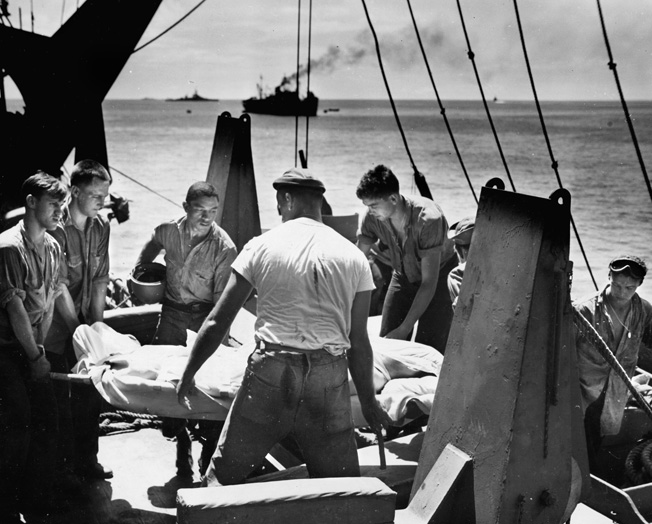
At the pier my stretcher was placed on a rubber raft containing several other wounded. The raft was pushed along the pier by Marines and corpsmen. The pier stretched about 1,000 feet out into the lagoon. We quickly ran into sniper fire from Japanese holed up in disabled amtracs. Several Marines were reinjured and had to be taken to the shelter of the pier. Other Marines went ahead and cleaned out the snipers.
At the end of the pier I was transferred to a Higgins boat to be taken to a troopship for medical attention. The corpsman aboard the craft asked if I wanted morphine. I was still in a half daze but was able to shake my head no. I’ve often thought that additional morphine at that time might have killed me.
“Grenade!”
I vaguely remember being winched aboard the troopship and being swung through the air on my stretcher like a giant pendulum. I saw cruisers and battleships circling warily. Destroyers patrolled around ponderous aircraft carriers as they sniffed for enemy subs.
As I was being lowered to the deck I heard voices shouting directions, and then I felt eager hands lifting my stretcher. The hands gently carried me across the hot deck and down a hatch. Near a bulkhead lay three lifeless forms, each wrapped in American flags. Our company had been in the first wave and suffered heavy losses. I wondered if I knew any of those flag-draped dead.
Then I heard a commanding voice say, “Bring him in!” I was put down onto a table inside an emergency room. My clothes were cut off and in the process a grenade fell out of my pocket and rolled across the floor. Panic ensued with medical personnel screaming: “Grenade! Holy s**t, a grenade!”
I managed to mumble, “No, no, it’s Okay, it’s Okay! It’s harmless until the pin is pulled.”
Nervous laughter broke out and the tension broke as the doctor and corpsmen teased and called each other “wimps.” Then I was turned over onto my stomach and the doctor quickly went to work on my legs. I heard a steady plink, plink, plink, plink as pieces of grenade were dropped into a metal tray. Almost musical, I thought with black humor. Yeah, some music.
3,407 Casualties on Tarawa
Finally it was over and I was taken down into the lower depths of the ship, along with other wounded. Conditions were dreadful. The area stank with the strong smell of sweat, unwashed bodies, and antiseptics. And it was hot.
Groans from the wounded resonated as I was placed in a lower bunk. I recognized one of the injured nearby. His name was Joey and was a member of my company. Joey wore a cast on his right arm and told me emotionally that he had lost a testicle. He was worried about Archie and Tom, his two brothers. The three had enlisted together in Reno and had made it through the Tulagi and Guadalcanal campaigns unscathed.
“Did you see ‘em, Nick?” he asked anxiously. I said, “Sorry, Joey, but I saw neither.” (We learned later that both his brothers survived.)
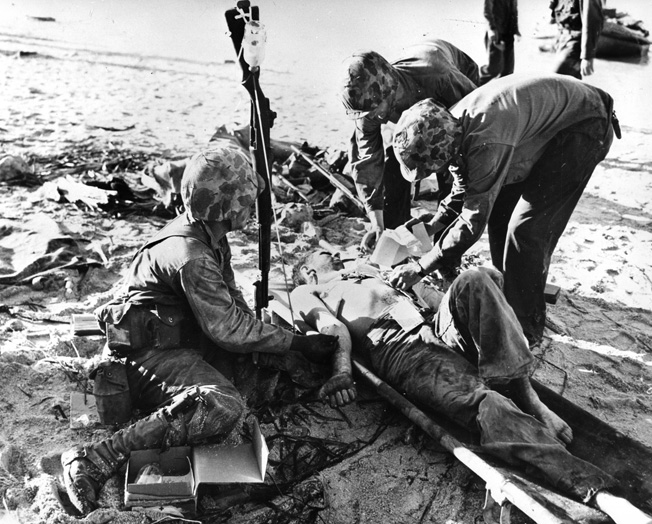
Then with elation we heard the welcome news that the savage Tarawa engagement was finished after “the issue being in doubt” during the early hours. For three horrendous days the ferocious Japanese fighters fought valiantly and just wouldn’t quit. They had to be bombed, blasted, and burned out of their formidable strongholds and improvised burrows. We also learned that a considerable portion of our losses had resulted from Higgins boats getting snagged on that damnable reef because of those those fatal tide miscalculations. Bitter lessons were learned and applied to future Marine and Army landings, which were credited with saving numerous lives.
Probably most Americans today never heard about Tarawa. If asked, they might think it’s a popular rap group or a new Japanese car model. They probably would be surprised to learn that in just three days of stunning savagery, 997 Marines were killed and 2,233 wounded. Another 88 Marines went missing and are presumed dead. Also killed were 30 sailors, while another 59 were wounded. Total American casualties: 3,407. The Japanese lost a lot more. Out of Admiral Shibasaki’s 4,800 troops, only 17 survived and he wasn’t one of them.
An Addiction to Pain Killers
Everyone settled in for the long journey to Hawaii. Overworked medical people managed to keep us sedated and quiet with morphine, the drug of the day. You wanted it? You asked for it and it was quickly obtained; I was among many requesting the precious painkiller.
After several grueling weeks at sea we reached Pearl Harbor on December 5. What a fantastic experience it was to be winched out of the ship’s innards on a stretcher and onto the main deck! I saw swaying palm trees framed against a turquoise sky. It was pleasantly warm. A mild breeze with the strong scent of salt blew in from the ocean and drifted over me. I savored the very smell of fresh air after the oppressive weeks in those fetid ship’s quarters. The sun bathed my eager upturned face as tears appeared on my cheeks.
We were transported by ambulance to the hospital. Before long we were into the routine of meals, changing bandages, playing poker, trading exaggerated tales, and penning letters home. One evening when I was feeling wretched and possibly depressed, I routinely requested morphine from the naval nurse on duty. She looked at me intently after inspecting my medical record. Then she said with authority, “No! You don’t need it.”
“What?” I complained. “Come on, now! I do need it. I really do!”
But once again she firmly said, “No, I keep telling you. You don’t need it and you’re not getting any. So forget about it and go to sleep.”
With a determined step the nurse left, leaving me speechless. Then came the sobering realization that she was perfectly right. I, like many others, was becoming addicted to the damn stuff.
I apologized to the nurse the next day. She smiled, patted my arm, and said sympathetically, “That’s okay, son, I understand. And don’t think you’re the only one.” From then on, despite occasional sweats, the only painkiller I requested was aspirin.
Returning Home on Leave
The following day came marvelous news. We were to be taken aboard the Solace, a hospital ship. Additional good news: we were scheduled to arrive in San Diego two days before Christmas!
The trip back home was without incident. When we reached the dock there were gray-clad women welcoming the wounded being unloaded. As my stretcher was being carried down the gangplank, all the women were smiling and cheerful. Except one. She was middle-aged and stared at me with almost a frown as I was carried by. I wondered: did I remind her of someone, maybe her son who perhaps had been killed in action and what business did I have being alive though seriously wounded and why me and not him? The incident still haunts me.
At the naval hospital in San Diego I was assigned to a room with five other Marines. One was a young boy, perhaps 18, whose right eye had been lost in combat. Every day near dusk one of the nurses would sit beside him and offer comforting words. The boy had told the nurses that he was afraid of losing his other eye to disease or accident. He was troubled by the dark. Occasionally, during the long nights, he could be heard sobbing. Then he was transferred to a special ward for the blind.
More surgery was performed to remove even more shrapnel from my shredded legs. I was encouraged to walk with crutches, and rehabilitation went smoothly. Soon I was able to cast aside the crutches as I healed rapidly. In late January I was overjoyed to learn I would be given a 30-day medical leave, and I happily left for the long train journey back to my hometown.
The reunion with my joyful family was memorable and marked by repeated kisses and an abundance of tears, cheers, and backslaps. My mother had concocted one of her incomparable spaghetti meals with spicy sausages and mouthwatering meatballs. This entrée was followed by chicken cacciatore. Bottles of robust red wine were shared. Zesty cheeses and a cornucopia of fresh fruit appeared magically. Italian liqueurs such as anisette graced the heavily laden table. The long-awaited night melted into early morning and was filled with joy, love, the telling of much-repeated stories, and the recounting of treasured memories of our great family life.
A month later I returned to the hospital, where I was discharged, and then assigned guard duty at the Marine base in San Diego. Several months later I was sent to a naval ammunition production base in Hastings, Nebraska. A contingent of Marines patrolled the huge base in Jeeps. (Tough duty, eh?) In late summer of 1944, I was sent to a naval air base in Corpus Christi, Texas, where again I was assigned to guard duty. Then on February 16, 1945, I was given a medical discharge and returned home.
The Continued Price of Service
I am now on the downward arc of my life, and over the decades I’ve occasionally wondered why I survived and so many others died. Some people might credit God; others might suggest serendipity or a guardian angel perched constantly on my shoulder. Still others might contend it was “peculiar circumstances” or just plain “dumb luck.” I’m baffled and am not afraid to admit that I just don’t know.
What I do know is that many veterans are still paying a prolonged and painful price for our service. Because of the remaining grenade fragments still in my legs, my wife laughingly calls me a “walking junkyard” and says that I clank when I walk.
I’ve had several hospital stays since being discharged in 1945. One incident was in 1985 in Tucson, where I now live. I was hospitalized for two weeks with a shrapnel-infection. During surgery, a shredded piece of my uniform was removed along with the offending shrapnel. That operation occurred 42 years after being wounded. And the latest hospitalization was in 2003, again due to infected shrapnel. That was almost 60 years after being wounded! And doctors tell me that the remaining shrapnel could cause another infection any time.
But, hey, I’m not complaining. How can I, when so many others suffered more horrible injuries, such as loss of limbs or the weeping lad I saw with almost half his jaw blown away. At least I’m alive, unlike all those young and courageous Marines whose lives were snapped off while still in their prime.
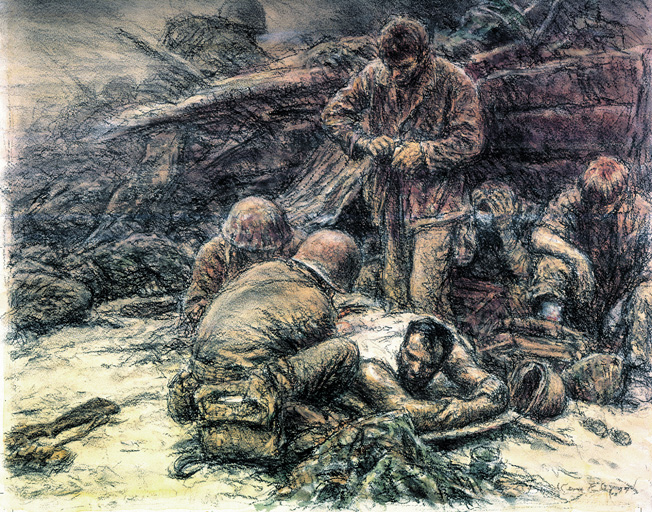
However, I still have philosophical questions regarding my personal Battle of Tarawa. For example, what if one of the Japanese I was unable to kill because my machine gun jammed was the one who later threw that grenade that wounded me? Or what if I’d survived intact and had gone on to fight in other campaigns and then gotten killed? Something else: Japan had purchased scrap metal from the United States before the war started. Could the fragments still embedded in my body be some of that metal? Sure, that’s unlikely, but life is sometimes very strange.
Here’s something more: I’ve often thought about the Japanese solider who threw the grenade that wounded me and was himself later killed. Whoever he was, I’ve long forgiven him. He did his duty as he saw fit, as I did mine. But who was he, how old was he, what was he like? Did he have a sense of humor? Was he an only child or did he have siblings? Was he as scared as I during that compressed time? He must have known he was going to die. What were his last thoughts? In other circumstances, could he and I have been friends, enjoying a cold beer or a cup of warm sake and sushi? Perhaps.
Haunting Memories of War
For some 60 years I apparently suppressed many of these wartime memories. After being discharged from the Marines, I earned a college degree in journalism and doggedly decided to “suck it up” and get on with my life and my career.
After I left service, I may have suffered from what used to be called shell shock but now is referred to as post-traumatic stress disorder. My patient mother sat up with me on many restless nights when I drifted in and out of horrific nightmares.
And after I married, I often would frighten my young wife Loraine with terrified outcries during my shattered sleep, such as, “Hey, they’re coming! We got to stop them now!” Loraine would comfort me by holding me tight and softly saying, “It’s okay, hon, it’s all over!”
The disturbing dreams went on sporadically for decades and I still occasionally wake up in a sweat. For years I seldom discussed my deeply embedded wartime remembrances. Loraine listened sympathetically on those rare occurrences when I did open up.
Civil War General William Sherman once observed that war is hell. It sure the hell is. And sociologists, psychologists, and historians talk endlessly about why soldiers commit atrocities. But war itself is an atrocity beyond true comprehension and measure. And I’m convinced that humankind must end wars or wars will eliminate humankind. Einstein said he didn’t know what atrocious weapons would be used in the next world war, but the war after that would be fought with stones.
Finally, I’ve given my Purple Heart and other campaign medals to Nickie, my 20-year-old grandson and namesake. I fervently hope that he never earns any war medals of his own.
This story was published WWII Quarterly Magazine.
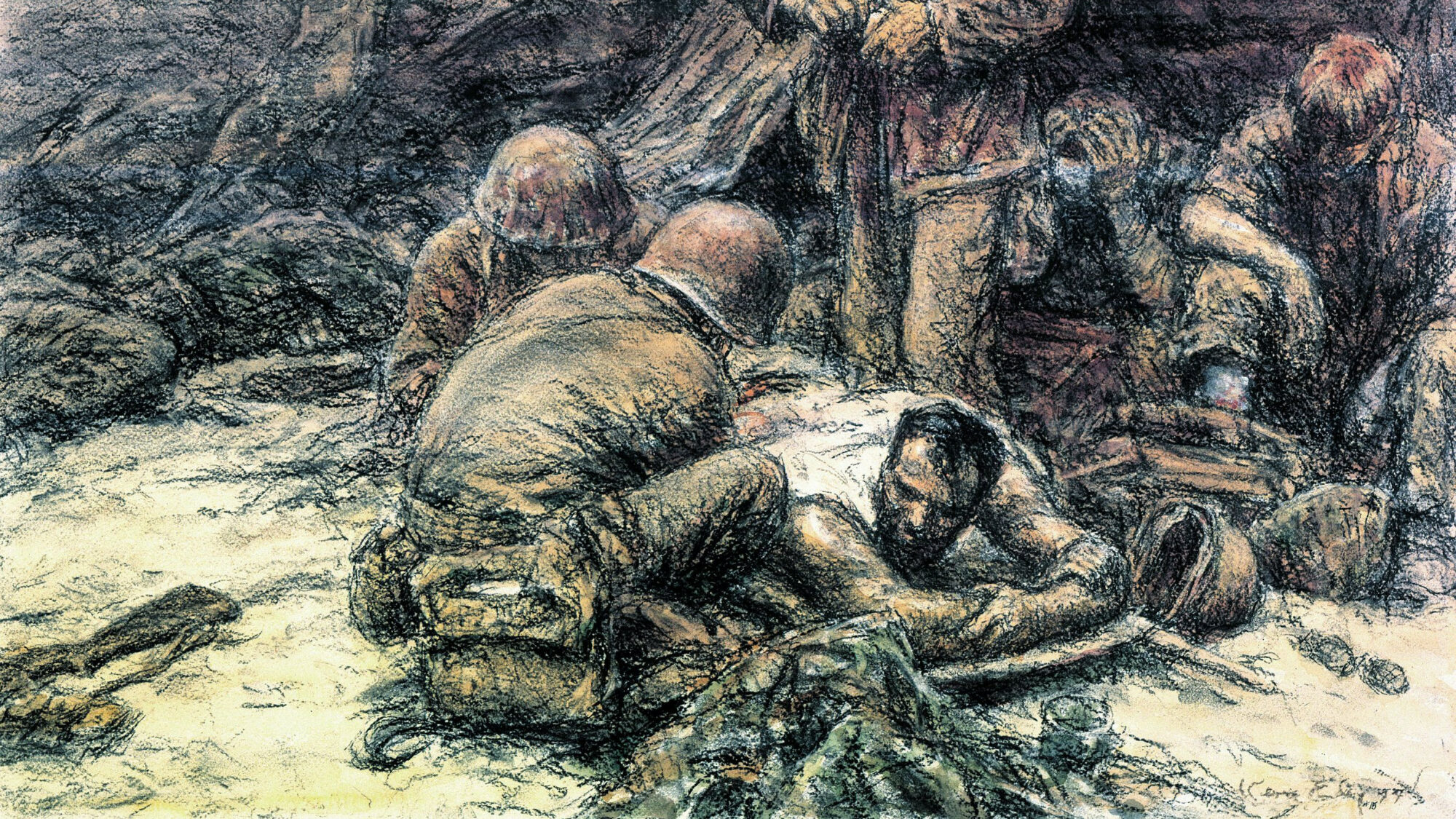
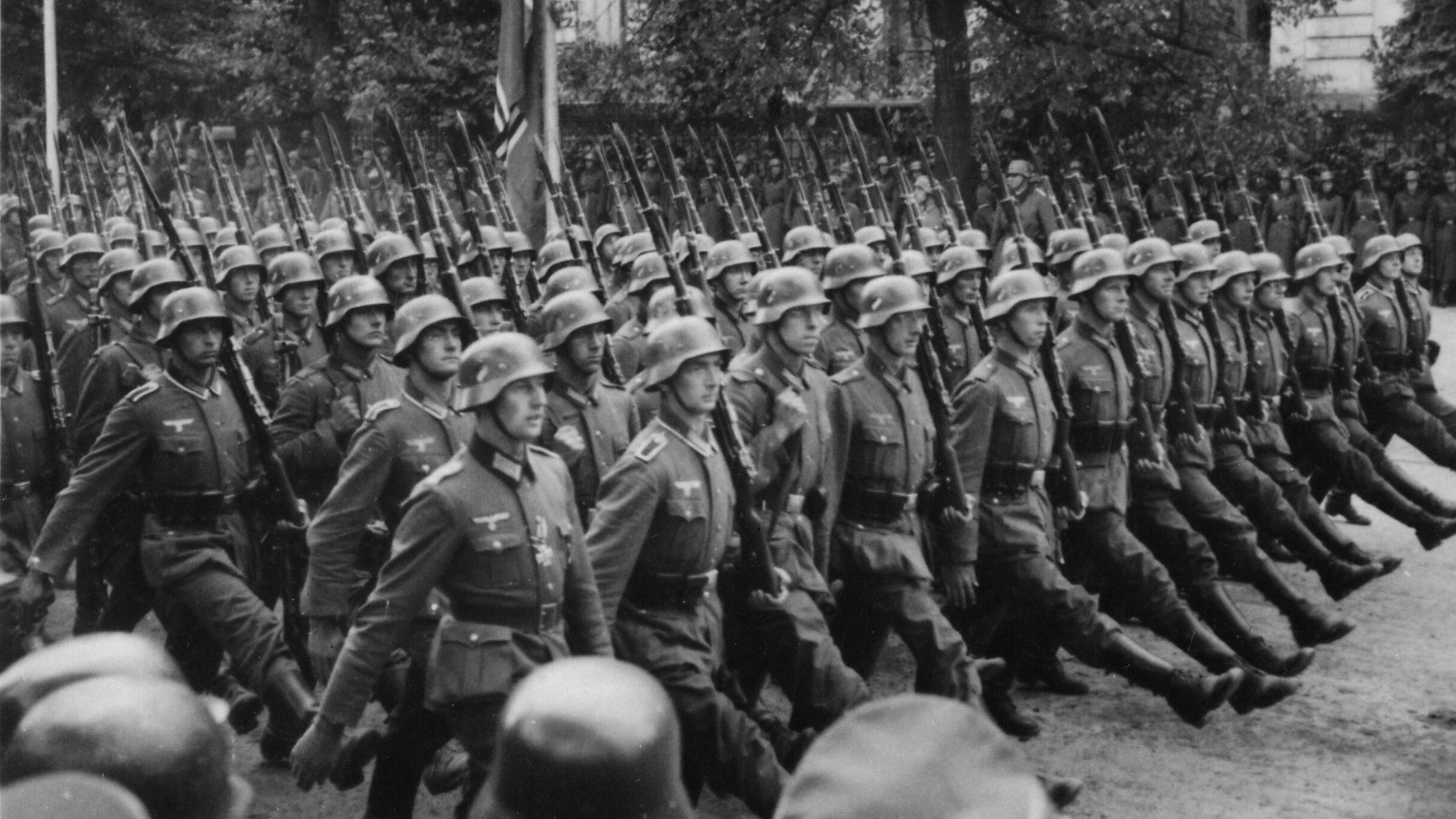
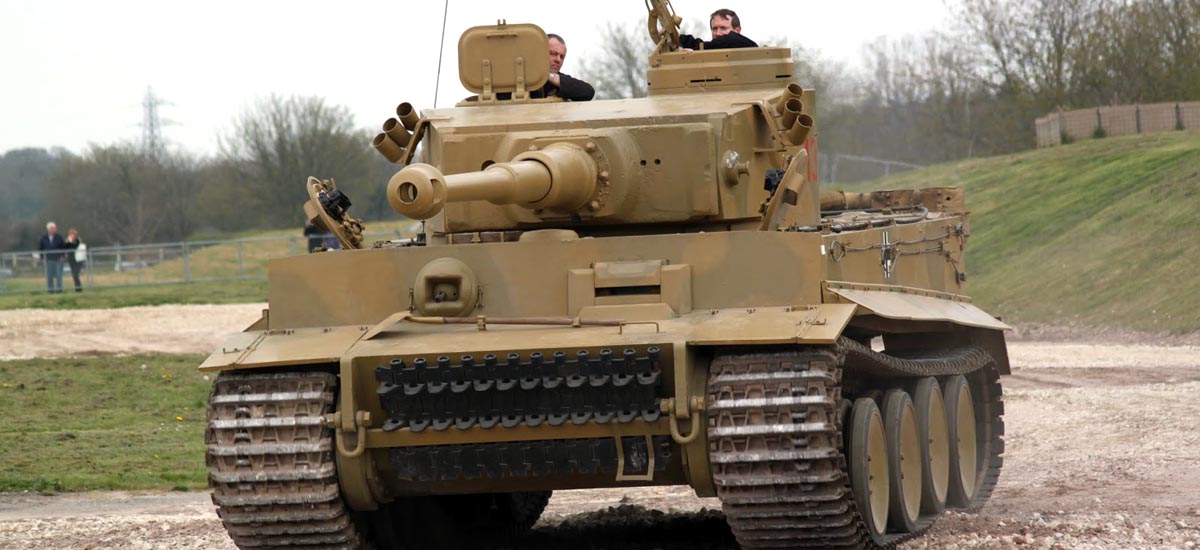
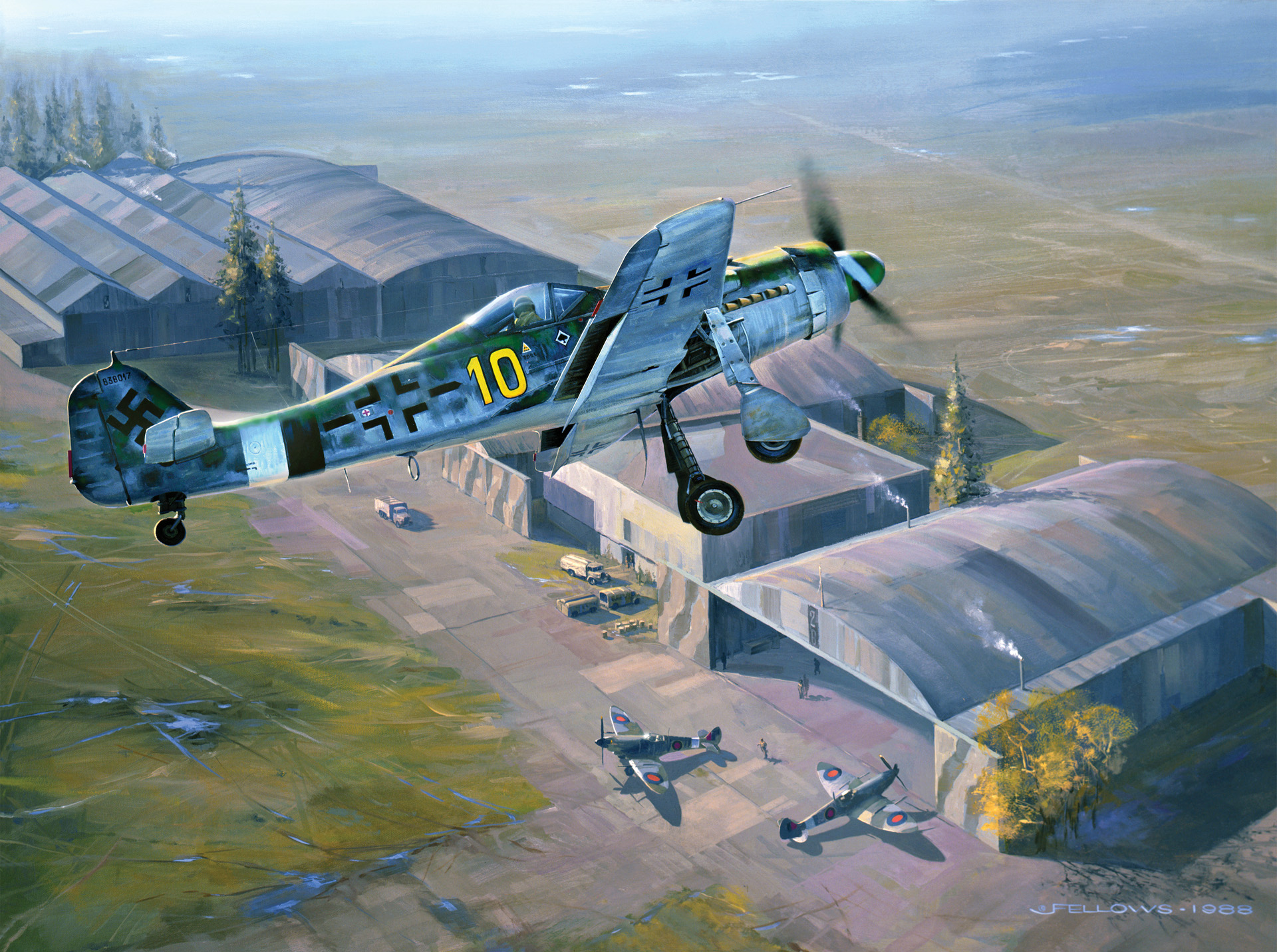
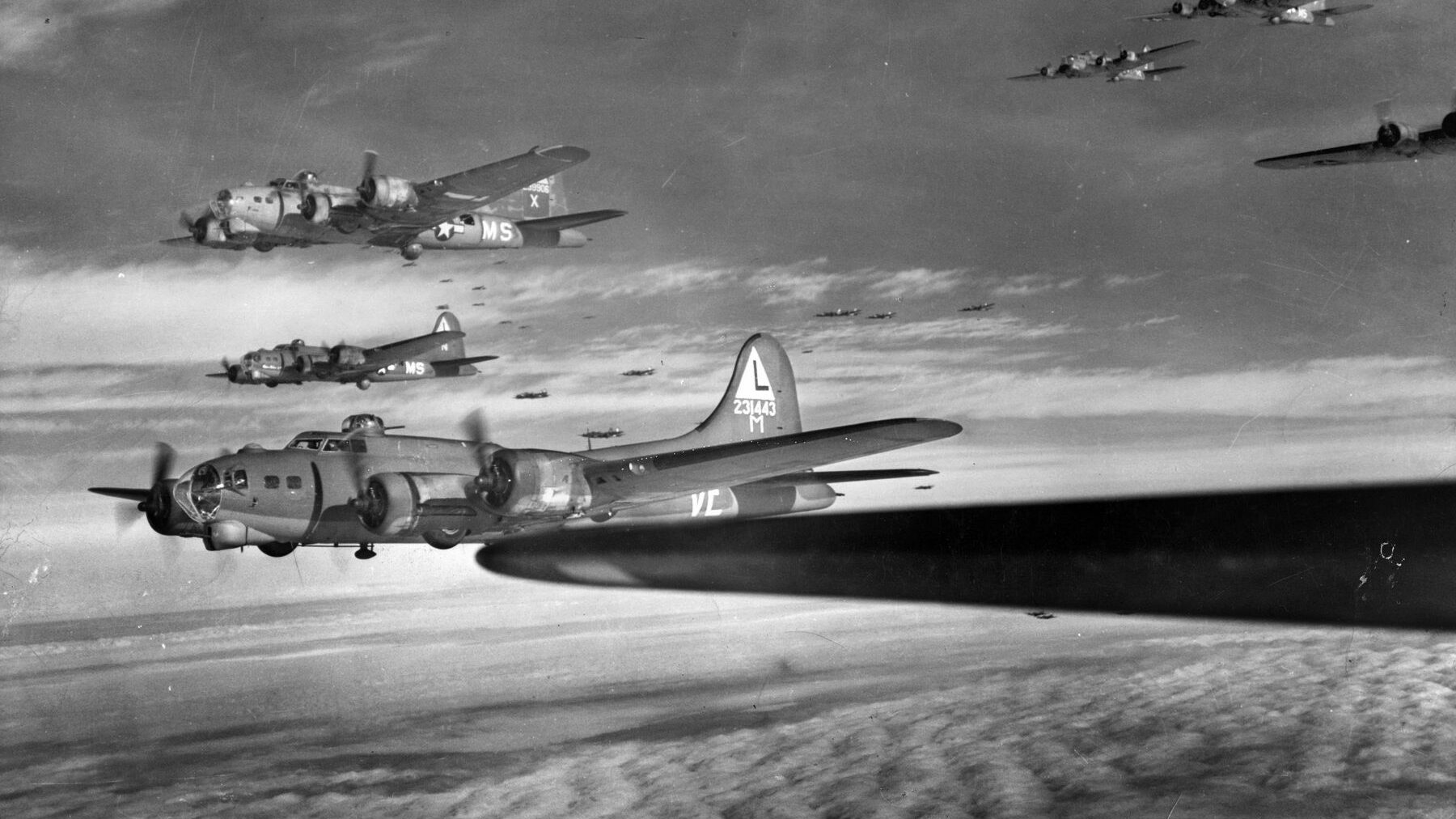
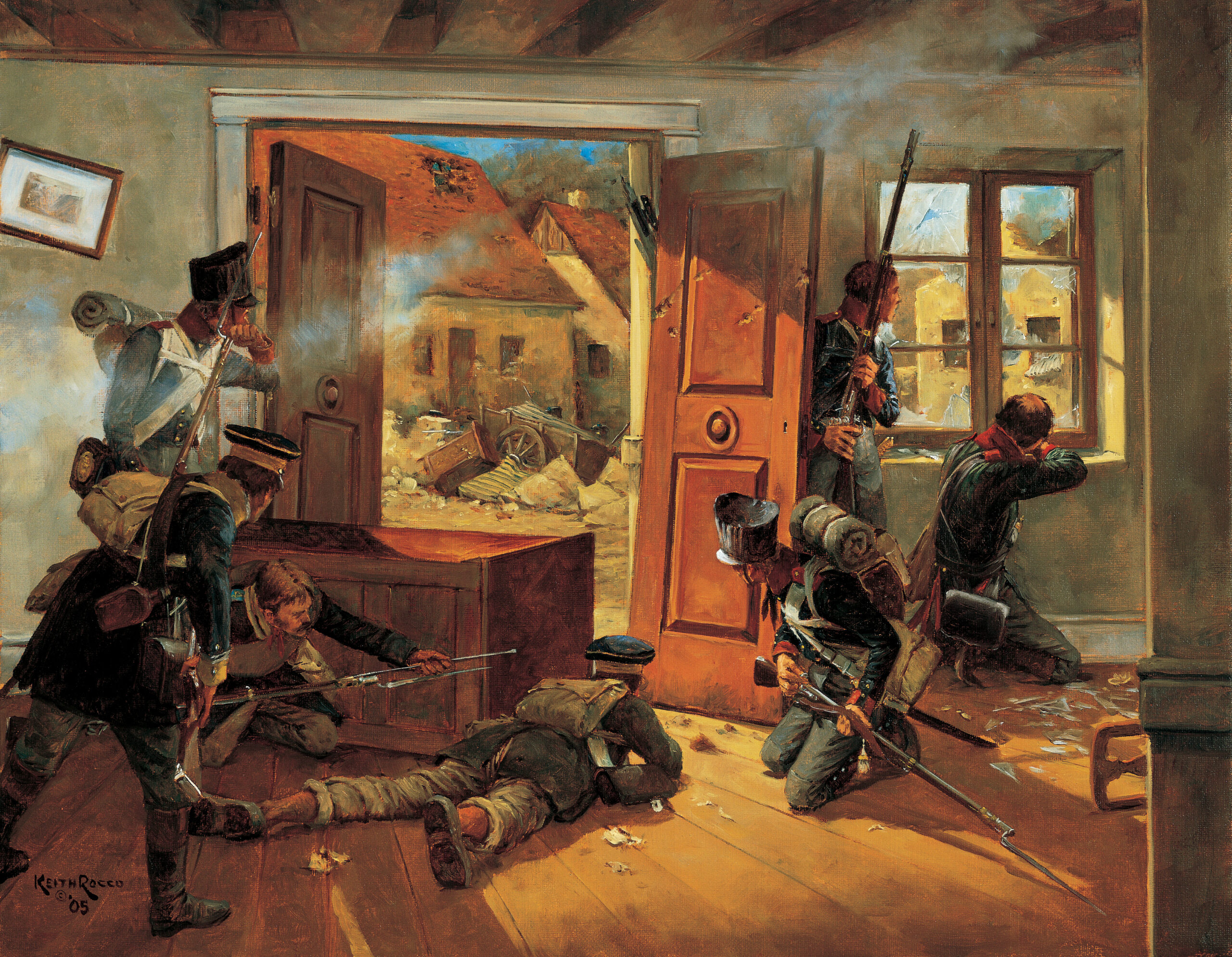
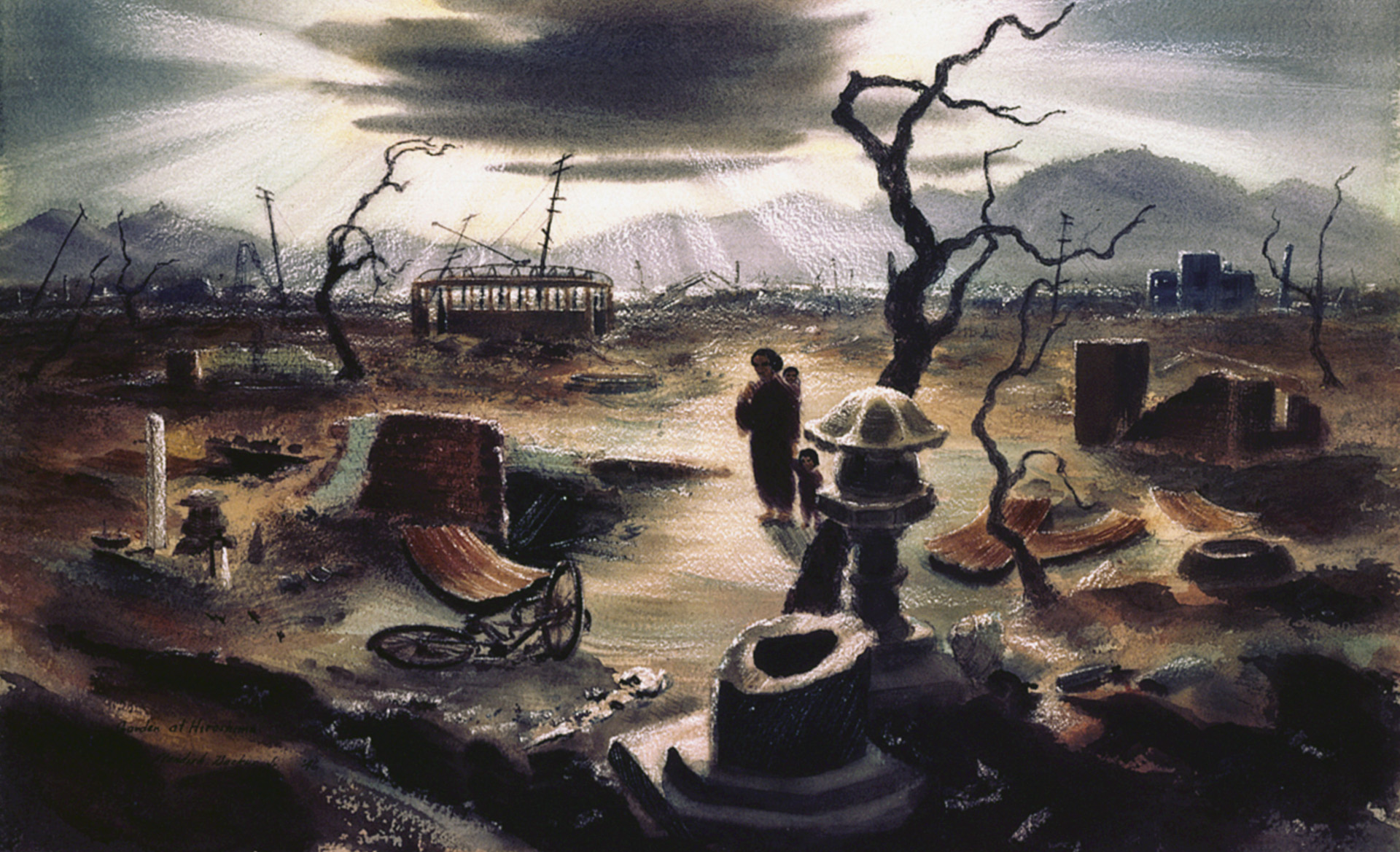
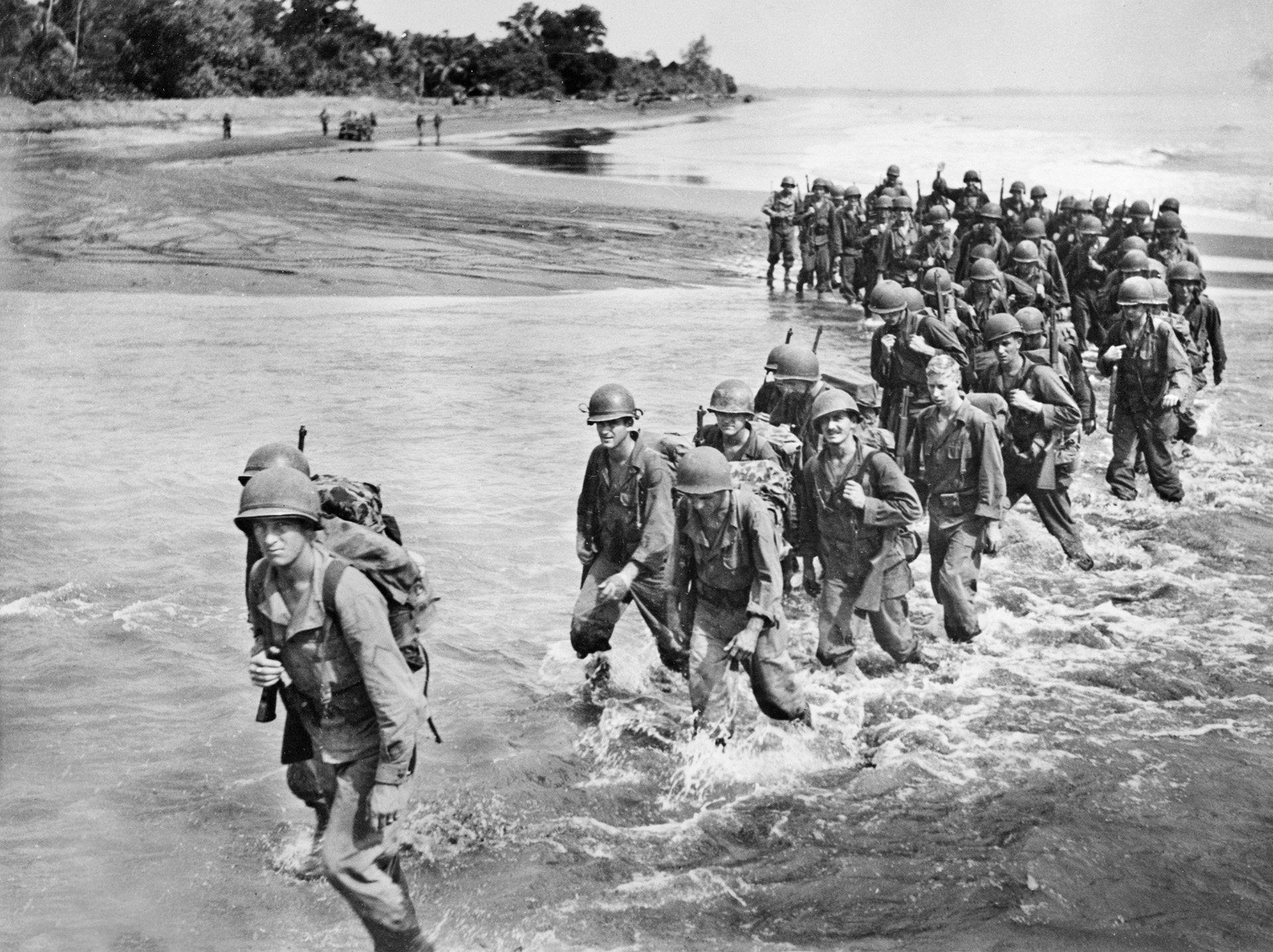
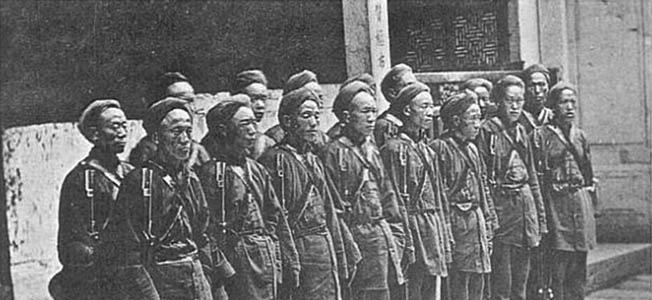
Not sure what to say about this article. My parents had friends who the husband lost a leg in the South Pacific. He suffered from PTSD through the years.
Many parents this past week lost sons and daughters in Kabul. Other soldiers got their purple hearts.
Excellent recounting of this Marine’s WW II experiences and his life afterward. Thank you for serving and giving so much to all of us.
I read this story with interest, since I am a Marine combat veteran of the Vietnam War. I had to laugh about the part where his grenade rolled out of his pocket while he was being treated for his wounds: I had the same thing happen to me while I was waiting to be taken in to surgery at Charlie Med in Danang! I had a grenade in my hand, since nobody wanted to be taken prisoner in our neck of the woods and that was always possible when you were evacuated by helicopter. The lead Corpsman went screamy crazy when he saw the grenade and I calmed him down, telling him that the things were “only paperweights until you pulled the pin”.
All I can possibly say is Thank you from the bottom of my heart and
I’m honored to live in the same city as you do.
Where would we have been without our Leathernecks? Men and boys who were willing to put their bodies and uncertain future between ourselves and the enemies of Freedom.
Thank you Sir, for letting us see the truth from your eyes. Well written.
What a powerful, well-written piece of history.
Thank you.